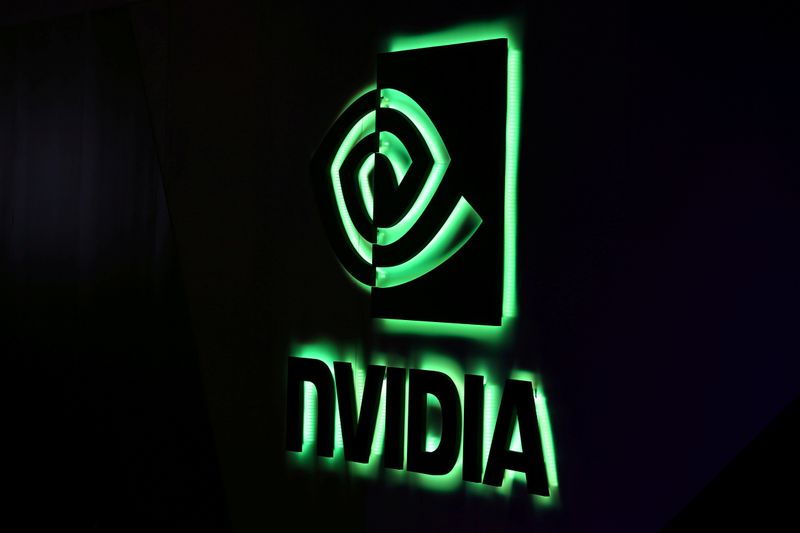SHANGHAI (Reuters) - Nvidia (NASDAQ:NVDA) Corp's $40 billion acquisition of chip designer Arm is set to catapult it into the fray of geopolitical tensions between Beijing and Washington, analysts and lawyers say.
Arm's blueprints for powering chipsets are a critical component for many Chinese smartphone makers and AI firms and China is expected to take a dim view of an American company having so much sway in an industry it has prioritised in its battle for tech supremacy with the United States.
"Anything that creates more concentration in the industry to the benefit of a U.S. company, I would think that's not aligned with what China wants, said Art Dicker, director at Shanghai-based R&P China Lawyers.
China's State Administration for Market Regulation, which has to give the go-ahead for the deal alongside other regulators globally, did not respond to a request for comment.
Shares of Nvidia rose 7.6% on Monday following the announcement.
Stewart Randall, who tracks China's chip sector at Shanghai-based consultancy Intralink, said that the acquisition, one of the largest semiconductor takeovers ever, will prompt many Chinese chipmakers to look for and develop alternatives to Arm, which is being sold by Japan's SoftBank Group Corp.
However, while a handful of options exist such as other open-source technologies RISC-V and MIPS, most cannot currently compete with Arm's mature ecosystem, tech experts say.
An executive from one Chinese startup said it had been looking at moving away from Arm for some time but considered it too much trouble. Now, he said, they plan to accelerate efforts.
Meanwhile, Arm's ownership by an American company also raises the possibility that Washington could place restrictions on its business in China, industry experts said.
The chief executives of Nvidia and Arm told Reuters in an interview that Nvidia will retain Arm’s United Kingdom headquarters - which exempt it from many U.S. export control laws - and open licensing model.
Britain's government will scrutinise the deal, including what it might mean for the company's headquarters in England, a spokesman for Prime Minister Boris Johnson said on Monday.
Chinese companies including Alibaba (NYSE:BABA) and Huawei [HWT.UL] are members of the RISC-V foundation, an open-source project that originated at the University of California, Berkeley and which many experts see as a potential beneficiary of any retreat from Arm.
China's government has also been pouring money into its domestic chip sector in hopes of fostering companies that can rival giants from the United States, South Korea and Japan.
Beijing helped close a 204 billion yuan ($28.9 billion) fund last year to finance semiconductor companies, after raising a nearly 140 billion yuan fund in 2014.
CLIENTS AND COMPLICATIONS
A key supplier to Apple (NASDAQ:AAPL), Arm does not make chips but licenses an instruction set architecture - the most fundamental intellectual property underpinning computing chips.
According to the company's most recent public filing before it was acquired by SoftBank in 2016, it generated about one-fifth of its revenue from China, where semiconductor startups have mushroomed in recent years.
First as a publicly traded British company and then as a unit of Japan's SoftBank, Arm's ownership was not an issue for China.
Huawei's Hisilicon chip unit used Arm designs to build its Kirin chips before Washington's trade restrictions on the Chinese company crippled the division, while Unisoc, a chipmaker owned by China's state-backed tech conglomerate Tsinghua Unigroup, counts on the company's blueprints.
They are used too by more specialised firms such as Shenzhen Goodix Technology Co Ltd, which makes chips for the internet of things, and Horizon Robotics, a Beijing-based startup maker of automotive chips valued at $3 billion in early 2019. The two companies did not respond to a request for comment.
Smartphone brands such as Oppo and Xiaomi (OTC:XIACF) Corp indirectly rely on Arm as purchasers of chips based on its designs made by Qualcomm (NASDAQ:QCOM) and MediaTek. Both companies declined to comment.
Further complicating the deal is a corporate dispute between Allen Wu, CEO of Arm's China JV, and the unit's parent company.
In June this year, Arm issued a statement saying that Wu had stepped down from his role, while Arm China has said Wu retains his position.
Arm and Nvidia say they are confident the dispute will be resolved quickly and will not interfere with the acquisition. Arm China declined to comment on the implications of the acquisition on its business.
Some analysts see Beijing using the uncertain status of Wu's control of the JV as leverage as it mulls approving the deal, perhaps pushing for a spinoff.
"The deal would include 47% of Arm China, but what does that mean anymore?" says Intralink's Randall.

"If this needs Chinese government regulatory approval, I can't see it getting it unless they get something big in return."